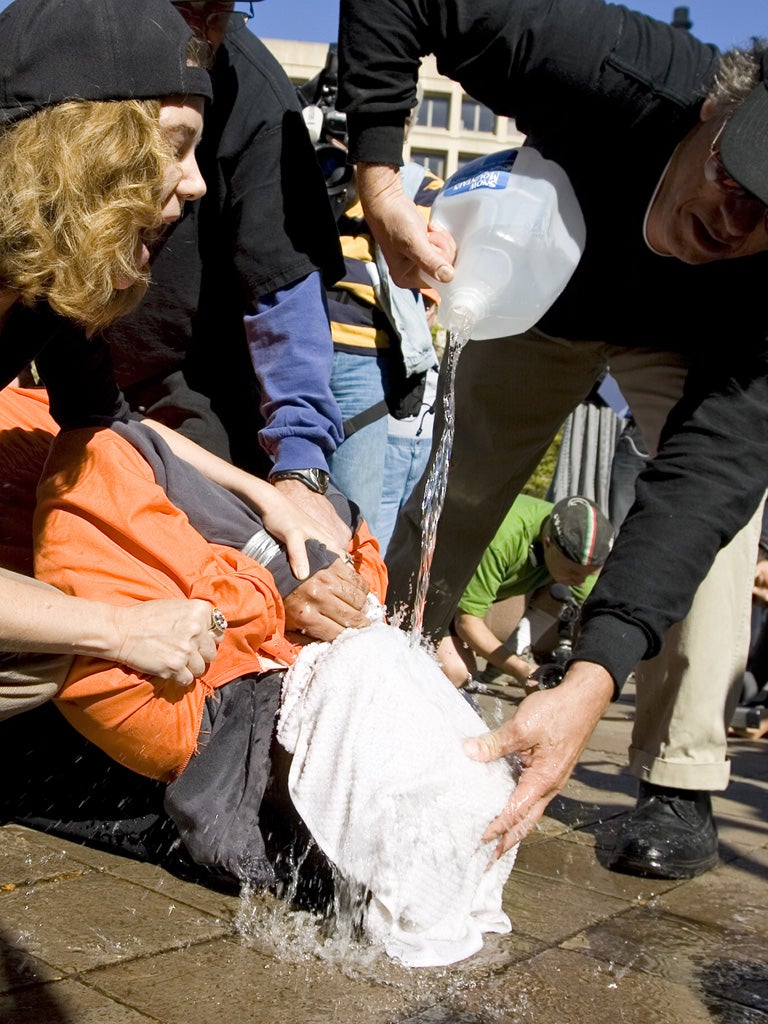Waterboarding and 'enhanced interrogation' shown to be ineffective
Official report finds that CIA's controversial techniques failed to help in hunt for Bin Laden

Your support helps us to tell the story
From reproductive rights to climate change to Big Tech, The Independent is on the ground when the story is developing. Whether it's investigating the financials of Elon Musk's pro-Trump PAC or producing our latest documentary, 'The A Word', which shines a light on the American women fighting for reproductive rights, we know how important it is to parse out the facts from the messaging.
At such a critical moment in US history, we need reporters on the ground. Your donation allows us to keep sending journalists to speak to both sides of the story.
The Independent is trusted by Americans across the entire political spectrum. And unlike many other quality news outlets, we choose not to lock Americans out of our reporting and analysis with paywalls. We believe quality journalism should be available to everyone, paid for by those who can afford it.
Your support makes all the difference.An exhaustive and systematic analysis has found that so-called "enhanced interrogation techniques" used by the CIA in the early years of the Bush administration to disrupt potential terror plots by al-Qa'ida were largely ineffective.
While a final draft of a report being prepared by Democrat members of the Senate Intelligence Committee has yet to be completed, let alone made public, sources told Reuters the report would give little evidence to demonstrate that the techniques were effective, even in helping to track down and kill Osama bin Laden. It may have instead provided false leads and bogus intelligence.
One official said the research, which involved going over millions of pages of documents handed over by the CIA, had yielded "no evidence" that waterboarding and other coercive interrogation methods had played "any significant role" in the years-long intelligence operations that eventually led to the killing of Bin Laden in a Pakistan safe-house by an elite team of US Navy Seals nearly a year ago.
Leaks about the findings will inevitably rekindle controversy about waterboarding and other techniques that have been debated in recent years. President Obama banned the methods upon taking office as unworthy of the United States. While some, including the former Vice President Dick Cheney, are on the record defending the techniques as having saved American lives; critics consider them torture.
Debate is likely to be fuelled by the long-anticipated publication on Monday of a book by a former chief of CIA clandestine operations, Jose Rodriguez, who argues that the harsh techniques, which also included subjecting suspects to nudity, prolonged physical stress and being hurled against flexible walls, produced valuable intelligence that meant plots were prevented.
"We made some al-Qa'ida terrorists with American blood on their hands uncomfortable for a few days," Mr Rodriguez says in an interview with CBS News' 60 Minutes programme to air tomorrow night focusing on the book, Hard Measures. "I am very secure in what we did and am very confident that what we did saved American lives." He cites a plot to blow up the Brooklyn Bridge as one that was thwarted.
Mr Rodriguez specifically cites the use of the enhanced methods on two of the most notorious US captives in the war on terror, Khalid Sheikh Mohammed, the self-avowed mastermind of the 9/11 attacks on America, and Abu Zubaydah. It was "about instilling a sense of hopelessness... despair... so that he (the detainee) would conclude on his own that he was better off co-operating with us," he says.
The CIA long ago confirmed that waterboarding, which involves dousing a cloth with water over a detainee's face, was applied to Sheikh Mohammed 183 times. Critics have noted that it was some time after it was discontinued that he gave up information about an al-Qa'ida courier that led the US to Bin Laden.
Part of the delay in completing the Senate report is a result of Republicans boycotting the work in 2009 because of difficulties interviewing witnesses to ensure the credibility of the documentary evidence. The Democrats pressed on, however, and it will still be deemed significant because until now no one, including the CIA, has attempted any such systematic analysis of whether the techniques worked or not.
Join our commenting forum
Join thought-provoking conversations, follow other Independent readers and see their replies
Comments